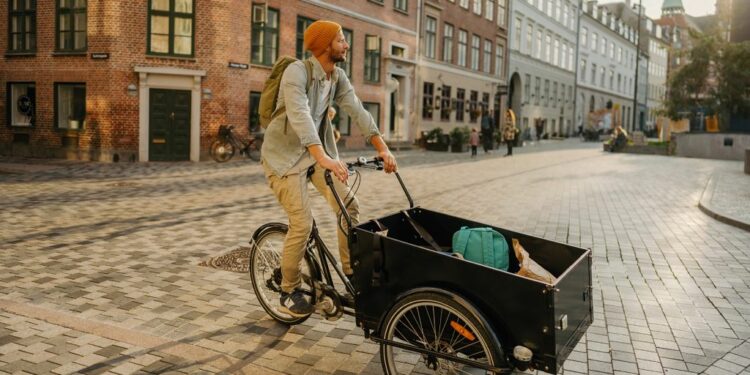Related
A faster, cleaner solution for last-mile delivery
A study from the University of Westminster, London, found that cargo bikes not only deliver faster than vans but also cut emissions by 90 per cent compared to diesel vans and when compared to electric vans reduce emissions by a third.
Another study in Brussels looking at the operational advantages of cargo bikes over vans found that when you factor in insurance, maintenance, depreciation, and energy costs, vans have five to 10 times higher expenses per parcel. According to the report findings, cargo bikes are not only an environmentally-friendly option but also an economically viable solution for businesses.
The challenges for cargo bike logistics
Cargo bikes, however, also come with specific challenges. Their limited load capacity and range make them less ideal for larger or long-distance deliveries.
But its important to remember they’re not designed to transport big loads between nationwide depots, instead cargo bikes excel in “last-mile” deliveries, especially for the smaller packages that make up the bulk of online orders.
Weather conditions also play a significant role in the effectiveness of electric cargo bikes. While they are ideal for steep or long routes, cold and wet weather can reduce their appeal.
Related
Research conducted by Trinity College in Dublin found that cargo bikes are preferred for longer trips in warm, dry weather, while poor conditions understandably diminish their desirability. Additionally, peak traffic hours further complicate route planning, demonstrating how weather and time of day interact to influence their overall performance.
Micro hubs are essential for ensuring the efficiency and cost-effectiveness of cargo bike operations, as they enable short distances between pick-up points and delivery destinations.
However, high-density areas, where cargo bikes would be most effective, often have higher land prices, making the establishment of micro hubs expensive.
One alternative is sharing deliveries among operators, which can increase efficiency but introduce logistical challenges such as parcel responsibility and additional sorting costs.
Companies like UPS have tackled these challenges by using strategically placed city-based micro hubs; essentially they are central containers that function as mini distribution centres, where delivery packages are stored and from where UPS service providers collect shipments.
Related
Supporting Cargo Bike uptake
Cargo bikes don’t come cheap and government subsidies can significantly help businesses make the switch.
In countries like Austria, Germany, and France, subsidies have been instrumental in lowering the financial barriers and helping drive adoption with financial incentives ranging from €200 to €2,000.
Safe cycling infrastructure is also crucial for increasing the adoption of cargo bikes. Narrow cycle lanes and physical obstacles present significant challenges for cargo bikes, which are wider, longer, and heavier than standard bicycles.
Current infrastructure in cities often fails to accommodate these larger bikes. Therefore expanding cycle lanes, reducing physical barriers, and creating more low-traffic neighbourhoods alongside national policies that increase investment in active travel, can significantly encourage cargo bike uptake.
Related
Norway recently opened its first Mobility Hotel in Oslo. The idea is that the hotel acts as a central hub for bikes in the heart of the city and offers a range of services under one roof, including vehicle purchases, financing options, service and maintenance, and vehicle modifications.
There are also amenities for workers like secure storage, and charging facilities for electric cargo bikes. The concept mirrors a similar Mobility Hotel opened in Gothenburg, Sweden.
As part of Amazon’s €356 million investment to decarbonise its UK transport network, they recently introduced a fleet of electric cargo bikes in Norwich to deliver thousands of packages per week.
Norwich joins over 40 other cities across the UK and Europe where Amazon’s micro mobility hubs support eco-friendly deliveries.
Rethinking urban goods delivery
Cargo bikes offer a flexible, zero-emission alternative to conventional delivery vehicles like vans.
Their ability to bypass congestion and parking restrictions and use dedicated cycle lanes gives them an edge in urban logistics, particularly in cities that are moving toward restricting vehicles.
There is also the added safety benefit that comes with reducing the number of large vans from narrow city streets.
Cargo bikes strike a balance between the agility and low operating costs of bicycles and the carrying capacity of small vans.
However, for cargo bikes to reduce emissions, alleviate traffic congestion, and lower delivery costs municipalities must provide the necessary infrastructure, like micro depots, and governments must provide supportive policies that encourage shared logistics networks.
The key to success lies in careful planning and collaboration between the public and private sectors.
Source link : http://www.bing.com/news/apiclick.aspx?ref=FexRss&aid=&tid=66f2f45d5f1545ecb3cdc399a01b1a42&url=https%3A%2F%2Fwww.yahoo.com%2Fnews%2Feuropes-love-affair-cargo-bikes-084204985.html&c=12246280670185340827&mkt=en-us
Author :
Publish date : 2024-09-22 01:43:00
Copyright for syndicated content belongs to the linked Source.


